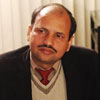Young housewives pull out best of their sarees while young men wear shades to the polling centre
No alcoholics loitering around on the streets, no glum faces grieving about lack of amenities and unemployment and no public fights over filling up water from the common pipes. The residents of Kelabadi, a lower-middle class slum on the outskirts of Dalli rajhara and part of Dondilohara assembly constituency, put their best foot forward on November 19, the day of reckoning for them and their counterparts in 72 assembly constituencies of Chhattisgarh.
As the sun, they took bath, had breakfast, put on their best dresses and queued up outside polling booths 192, 193 and 194 housed in a government middle school. Young housewives pulled out best of their sarees, wore bangles (some of them up to elbows) and bindis matching with the colour of their saree and coyly walked behind their husbands to the polling centre.
Young men wore goggles and drove to the polling centre on their bikes. For whatever reason, they were courtesy personified till voting ended on Tuesday.
Ram Kumar Sonawane (see picture), a local resident who performs on Chhattisgarhi film songs, in fact changed his outfit thrice in less than 16 hours.
Sonawane, who has grown a moustache like brigand Veerappan, first appeared in the polling centre in fatigues on November 18, and the 20-member Border Security Force (BSF) team deployed there for security mistook him for an armyman. In morning, he wore a cowboy hat and green and red-striped shirt.
After 11 am, he roamed around dressed in green and red clothes (the colour of the Chhattisgarh Mukti Morcha, or CMM, flag).
There was competition to be the first voter in all three booths. Apparently, the election agents of the three major contenders – Congress, Bharatiya Janata Party and CMM – who were inside since 7 am, when the electronic voting machines (EVM) were first tested, had an advantage in this. No wonder, in booth number 192, Jitendra Matre, a BJP agent, beat the competition to be first voter.
But in booth 194, a youth called Mahendra Sarva pipped the party agents to the post.
The old, middle-aged and young – all of them looked happy, fresh and posed gaily for the pictures. By 11 am, over 50 percent of the total 1,617 voters had their index fingers inked. After that, voting turned into a trickle and in the last three hours before close the polling officers were literally waiting for the voters. Only half a dozen voters turned up in the last one hour. When the clock struck 5 pm and the security men were about to close in, an old couple came running – they were allowed to make use of their franchise!
By day end, combined polling of the three booths stood at more than 77 percent. Booth 192 clocked the highest (over 79 percent), while women voters (644) exceeded their male counterparts (604) in exercising their franchise.
Significantly, the polling day was the also first day in the last 20 when a drunken man did not try to engage this correspondent into a conversation! The BSF team claimed credit for enforcing the prohibition.
The only blip on the free and fair voting in Kelabadi was a rumour that said Narmada Sahare, the Congress municipal councilor, had asked the voters to stay off button number 5, which belonged to CMM candidate Janak Lal Thakur. Though Sahare, when confronted by CMM workers, called it a joke, it was obviously an attempt to keep the voters off ‘kite’, the electoral symbol of CMM.
The presiding officers of all three booths were in direct contact with the election commission of India in New Delhi through the day and each one of them would have sent the mandatory 15 SMSes by the end of November 19. The PO began the day by sending an SMS at 7 am after testing the EVM, followed it up with another one at the start of voting at 8 AM and yet another one at 9 am about the status of polling. After wards, the PO sent a message after every two hours till 5 PM. He sent a message again after sealing the EVM and another one after its submission at district headquarters.

